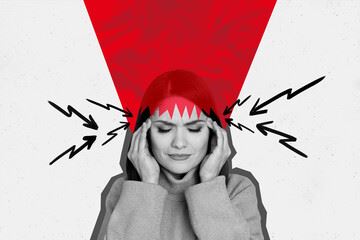
About a third of chronic migraine sufferers overuse their prescribed pain medications. Medication overuse creates an additional problem because the medication effects wear off over the course of a day, triggering medication-withdrawal headaches. Standard treatment involves a gradual reduction in medication followed by the prescription of prophylactic medication and patient education. There have been some uncontrolled pilot studies suggested that mindfulness training may also be helpful for migraine sufferers.
Grazzi et al. [Journal of Headache and Pain] conducted a phase-III randomized, controlled trial to test whether adding mindfulness training to treatment-as-usual (TAU) could improve headache frequency, medication overuse, and quality of life in chronic migraine sufferers.
The researchers randomly assigned 177 patients at an Italian specialty headache treatment center (average age = 48 years; 89% female) who met two criteria: 1) experienced at least 15 days of migraine and medication-withdrawal headaches per month, and 2) were overusing their medication. These patients were assigned to one of two groups: TAU or TAU plus mindfulness training.
All patients went through an intensive 5-8 day titrated medication withdrawal protocol as either inpatients or day patients. After discharge, they were provided with individually-tailored prophylactic medication regimes and received education on medication use, diet, exercise, sleep hygiene, and related health issues.
Patients in the TAU plus mindfulness group also participated in six weekly 90-minute group mindfulness training sessions. Each session included mindfulness meditation practice (ranging in length from 5 minutes in the first sessions to 25 minutes by the fifth and sixth sessions). Additionally, participants were asked to engage in 3-10 minutes of home meditation practice during weeks 3 to 6.
Patients were assessed at baseline and 3, 6, and 12 months using measures of headache frequency, disability, quality of life, and medication use.
By 12 months, a significantly higher proportion of patients in the TAU plus mindfulness group (78%) achieved a ≥50% reduction in headache frequency compared to the TAU group (48%). The TAU Plus mindfulness group showed significantly more improvement on measures of migraine-related quality of life and disability than the control group.
Further, the mindfulness group showed significantly greater reductions in pain medication use and lost productivity than the control group. Total migraine-related healthcare costs were $938 lower in the TAU plus mindfulness group as compared to controls at 12 month follow-up.
The study demonstrates that mindfulness training provides additional benefits beyond treatment-as-usual for migraine sufferers in terms of headache frequency, disability, lost productivity, medication usage, and associated healthcare costs.
The study focused on a specific patient population of severe migraineurs who were treated in an intensive headache specialty center. As such, the findings may not apply to other populations with different migraine severities or treatment settings. Patients in the mindfulness group received more attention and may have received more didactic information than TAU patients so all improvement may not be attributed to mindfulness practice.
Reference:
Grazzi, L., D’Amico, D., Guastafierro, E., Demichelis, G., Erbetta, A., Fedeli, D., Nigri, A., Ciusani, E., Barbara, C., & Raggi, A. (2023). Efficacy of mindfulness added to treatment as usual in patients with chronic migraine and medication overuse headache: A phase-III single-blind randomized-controlled trial (the MIND-CM study). The Journal of Headache and Pain, 24(1), 86.
Link to study